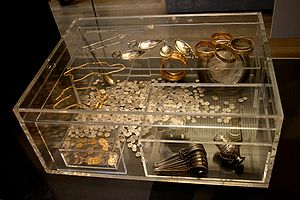
The Hoxne Hoard is the largest hoard of late Roman silver and gold discovered in Britain,[3] and the largest collection of gold and silver coins of the fourth and fifth century found anywhere within the Roman Empire. It was found by Eric Lawes, a metal detectorist in the village of Hoxne in Suffolk, England, on 16 November 1992, the hoard consists of 14,865 Roman gold, silver and bronze coins from the late fourth and early fifth centuries, and approximately 200 items of silver tableware and gold jewellery.[4] The objects are now in the British Museum in London, where the most important pieces and a selection of the rest are on permanent display. In 1993, the Treasure Valuation Committee valued the hoard at £1.75 million (today £3.18 million).[5]
The hoard was buried as an oak box or small chest filled with items in precious metal, sorted mostly by type with some in smaller wooden boxes and others in bags or wrapped in fabric. Remnants of the chest, and of fittings such as hinges and locks, were recovered in the excavation. The coins of the hoard date it after AD 407, which coincides with the end of Britain as a Roman province.[6] The owners and reasons for burial of the hoard are unknown, but it was carefully packed and the contents appear consistent with what a single very wealthy family might have owned. Given the lack of large silver serving vessels and of some of the most common types of jewellery, it is likely that the hoard represents only a part of the wealth of its owner.
The Hoxne Hoard contains several rare and important objects, including a gold body-chain and silver-gilt pepper-pots (piperatoria), including the Empress pepper pot. The Hoxne Hoard is also of particular archaeological significance because it was excavated by professional archaeologists with the items largely undisturbed and intact. The find has helped to improve the relationship between metal detectorists and archaeologists, and influenced a change in English law regarding finds of treasure.
THROWBACKTHISDAY; makes it 23 years and TBT blog remembers.
No comments:
Post a Comment